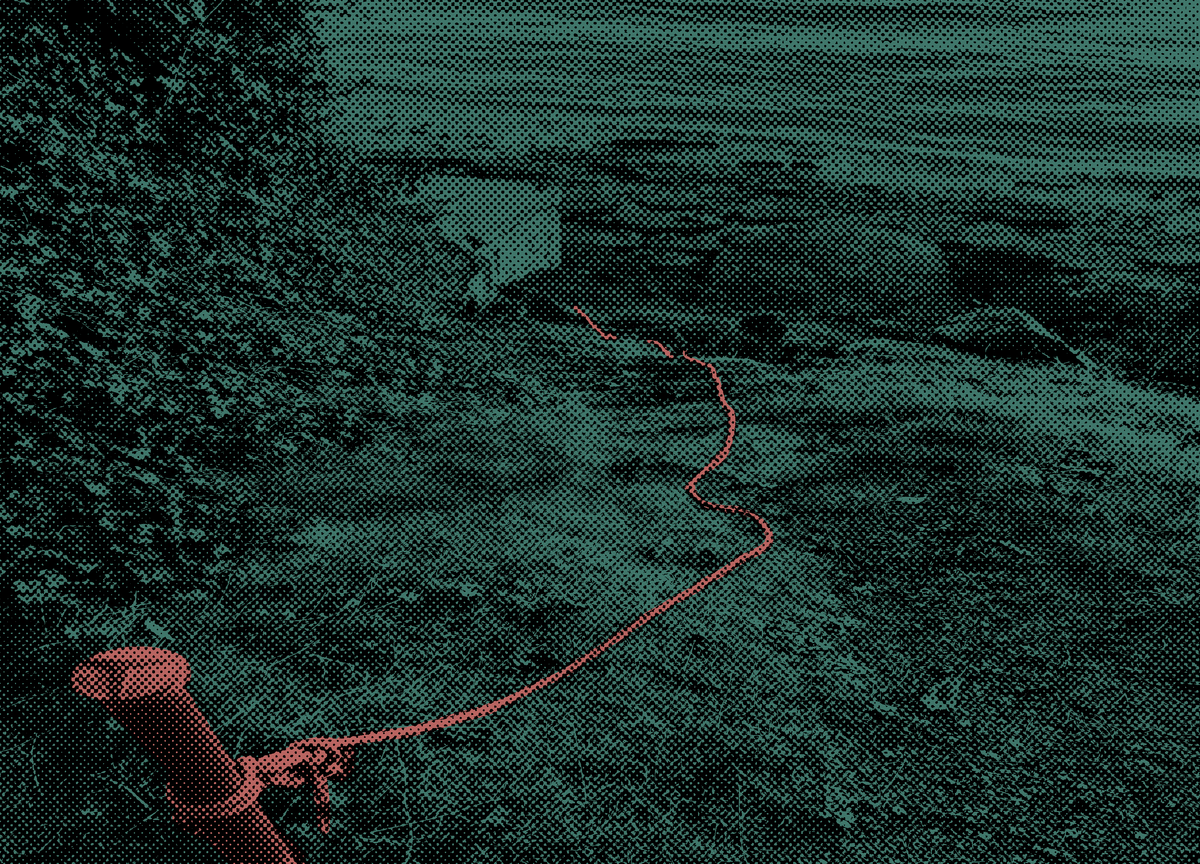Abandoned Psychogeographical Journal Entry Where Nothing Happens

[one Saturday in January]
I was about to head out on a walk. One of those freakish sun-blistered but still cold winter days in Seattle. For no real reason I downloaded a “psychogeography” app, allegedly based on the philosophies of Guy Debord and chaos theory. The app claims to operate on some kind of “quantum” or “pseudo-quantum” randomization. I didn’t see how that could possibly be true but fuck it. The idea is that you set an “intention” in your mind and then use the app to generate a random geographical point in your area. Then you walk to that point.
So I did that. Don’t ask me what my mental “intention” was because I don’t remember and also it’s a secret. The app took me to a point I’d never been to, about a 20-minute walk from my apartment, in the Lawtonwood neighborhood adjacent to Discovery Park. Right at the edge of the water. A place notated on the in-app map as “45th Avenue West Street End.” I vaguely remembered that Seattle has a “shoreline street ends” rule that if a street ends at the water, there has to be a public path or lookout of some kind at that location, however small. The 45th Avenue West Street End marker did not appear on my regular phone map, only the in-app map.
I walked down there—an achingly gorgeous walk in the frozen sunshine. I took Texas Way, a road along the edge of the park (my 4-year-old calls it “Shady Way”), past ruined former army buildings partly reclaimed by various aggressive mosses and lichens. Then I walked down Lawtonwood Road, through the forest, into a very quiet and very wealthy neighborhood.

Psychogeography sets for itself the study of the precise laws and specific effects of the geographical environment, whether consciously organized or not, on the emotions and behavior of individuals. The charmingly vague adjective psychogeographical can be applied to the findings arrived at by this type of investigation, to their influence on human feelings, and more generally to any situation or conduct that seems to reflect the same spirit of discovery.
–Guy Debord, “Introduction to a Critique of Urban Geography,” 1955, trans. Ken Knabb

As I was walking along Texas Way, three Seattle Police SUVs drove past me. I thought how bizarre/cool it would be if they were headed to my same destination. Not because I ever want to hang out around cops but because it would be odd, and I was in the mood for odd.
Turns out they were. At the final intersection, just before a small country lane, one Seattle PD vehicle was partly blocking the road. As I walked up, I saw a meaty-looking cop exit the SUV and stomp off to the right, across a small wooden bridge. I looked over and saw two more PD vehicles across the bridge, next to a huge mansion. A hushed rustle of conversing policemen vibrated outward from the trees. No idea what was happening there. Probably some shipping magnate or tech investor complaining about scruffy individuals like me wandering around their isolated neighborhood. Or maybe a double murder.

The sudden change of ambiance in a street within the space of a few meters; the evident division of a city into zones of distinct psychic atmospheres; the path of least resistance that is automatically followed in aimless strolls (and which has no relation to the physical contour of the terrain); the appealing or repelling character of certain places—these phenomena all seem to be neglected.
–Debord, ibid.

I waited till the SUV was free of cops (more and more kept spilling out, sort of a clown-car situation), and then I kept walking past it to the end of the lane, which overlooked the water. One big honking mansion, all windows, all silent, stood to my right. To the left, past the end of the road and almost invisible until you were right next to it, a thick rope or cord was tied to a metal pole. Like a climber’s rope. The rope led down a nearly destroyed set of stone stairs, really just a few slabs of rock jammed into the soil, then down the hill to the rocky beach, overlooking Puget Sound. Visible across the water: various Ballard beach shacks, whalelike condo blocks, the sand at Golden Gardens, the big red sign for Ray’s Boathouse. The Olympics crinkled along the horizon like paper cutouts. I held the rope and made my way partway down the stairs but stopped before getting all the way to the water line (too steep). Maybe I fucked up here, like I should have continued onward. Like I would have met a mysterious blurred figure in a beach cave who would offer me three riddles or a curious green-black amulet. I don’t know. To my left were these massive stepped concrete blocks, like the cracked stairway of a giant, leading eventually to another house way up the hill with a big Private Property sign. The blocks had some graffiti on them. I stood there for a bit, snapped some pics and a video, and hauled myself back up the rope/stairs.
The cops were just pulling away as I walked back. The end.
None of this means anything, probably, but it was cool for a minute, like I was cosplaying as the protagonist in a surrealist novel. One of those things where the moment feels freighted with significance, buzzing with potentiality, lots of irritating literary phrases like that, like anything could happen, like you want something to happen so badly, anything, but then nothing does.
But you still can’t choke out this ridiculous little bubble of optimism that says: Maybe next time.
